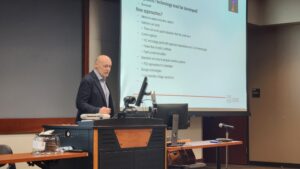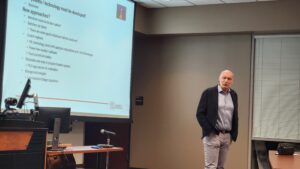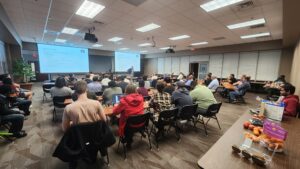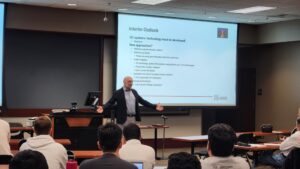
- This event has passed.
DC surface current and partial discharge experiments at highly stressed and polluted insulators
March 27, 2024 @ 2:00 pm - 3:00 pm
Joint Technical Seminar of Tallahassee IEEE PES Chapter, FAMU-FSU College of Engineering, and the Center for Advanced Power Systems
Title: DC surface current and partial discharge experiments at highly stressed and polluted insulators
Presenter: Dr. Peter Zeller, Upper Austria University of Applied Sciences, Wels, Austria
Time: 2:00 pm – 3:00 pm, Wednesday, March 27, 2024
Location: Room 120, Center for Advanced Power Systems
Abstract
DC technology is an energy-efficient and environmentally friendly approach to integrating large energy storage systems and renewable energy resources (such as wind and PV) into the grid. An important design parameter for DC components is the required creepage distance along any insulator, insulating, and polluted surface.
Our investigation into the performance of several insulator (bulk) materials (glass, PVC, and epoxy resin) polluted with graphite, sand, and saltwater was conducted with a robust and reliable test setup. This setup, consisting of an electrode geometry that applies an almost uniform electric field along the test sample surface, allowed us to measure the surface current and the partial discharge (PD) activity. We ramped the voltage level up to 60 kV in 5 kV to 10 kV steps, achieving a maximum electric field strength of 10 kV/cm, ensuring accurate and comprehensive data collection.
The surface current was measured using a custom low-cost current sensor connected via a glass fiber communication to a personal computer. The results presented in the talk underscore the crucial role of pollution in influencing the surface current level, particularly when the pollution is in motion on the insulator’s surface. Conductive pollution profoundly impacts the effective creepage distance. The local field distribution (field excess) in the vicinity of pollution triggers PD, as does the movement of mobile pollution particles. The mobility of pollution is a complex interplay between the type of pollution and the bulk material, further emphasizing the importance of our findings.
Our future work holds promise for further advancements. We plan to delve into specific environmental conditions, such as humidity and temperature, which could provide valuable insights. Additionally, we are excited to extend our tests to a combined stress setup, incorporating a DC source and a lightning pulse generator. This concept, introduced in the seminar, opens new avenues for exploration and potential breakthroughs.
Biography
Dr. Peter Zeller received his Ph.D. from the Technical University of Vienna (Institute for Switching Technology and High Voltage Engineering), where he investigated the influence of gas flow on magnet blast arc motion in miniature circuit breaker arc chutes. He started his industry career at the surge arrester R&D department at ABB / Switzerland. In 2000, he joined the University of Applied Sciences Upper Austria (Wels) and, in 2023, the “Energy Institute” at the Johannes Kepler University in Linz / Austria. He developed several international study degree programs focusing on energy engineering. In 2015, he invested 3,000,000 euros in a high-voltage and high-current test facility. Dr. Peter Zeller’s current research is at the forefront of shaping the future of electric energy distribution and storage systems. His focus on compact high-power fuses for electric cars, electric insulation systems for DC applications, and the short circuit and overvoltage protection of DC power supply is paving the way for more efficient and sustainable energy solutions. As the head of the technical department at the “Energy Institute,” he leads the investigation of approaches for future renewable and low-carbon technologies energy supply, instilling hope for a greener future. Peter Zeller is a co-founder of the Austrians DC initiative and a member of several associations (IEEE working group TC 81 for lightning protection, Current Zero Club for low voltage).
Dr. Peter Zeller



